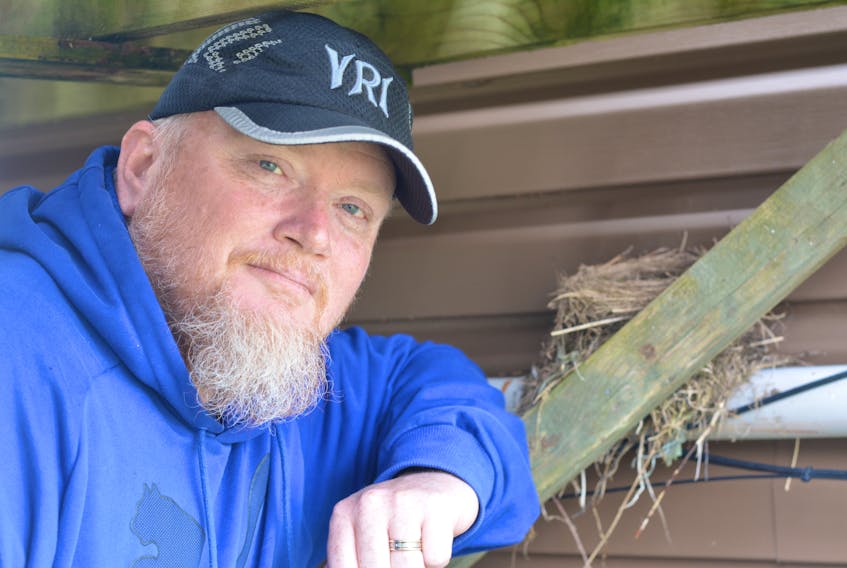ST. JOHN'S, N.L. — Barb Sweet
The Telegram
Under Jason Dicks’ back deck in Cowan Heights, there’s a little family — four little robin eggs in a nest being tended to by the mom, with visits from, presumably, the dad.
For a veteran suffering from anxiety and post-traumatic stress disorder (PTSD), watching life evolve for that little bird family is a distraction that is helping Dicks cope with those symptoms.
"That’s the biggest upside to this thing. I almost become kind of mesmerized by it in a way. I have a hard time going around the yard and doing things. It is a distraction my mind is more preoccupied with now,” Dicks said.
So as to disturb the budding bird family as little as possible, he took an old cellphone, hooked it up to wifi and set it up to stream the goings on in the nest, which he’s been monitoring remotely and posting to his Facebook page, “The Snapping Veteran.”
“Thank you for this … life goes on. I am having a dark day, so this really helps,” wrote one of the followers.
“The winter, I noticed a whole nest under the patio. I never noticed it before and I decided to keep peeking at it now once the spring hit,” said Dicks, who spent 18 years in the military, including a stint in Africa in 2001.
“At the end of last week, there were two eggs, then the next day, three, and the next day, four.”
From his patio he can watch the stream on his laptop, with the bird flying in to plop on the nest. If anyone looks under the deck, the bird will sound off from a nearby tree.
He suspects it’s the same robin that was around last year.
The eggs are likely to hatch in five days to a week.
Dicks is no hobby birdwatcher, but appreciates them.
“It’s the first time I have paid attention,” he said.

Bruce Mactavish, author of the “Winging It” birdwatching column, said robin nests are common in metro St. John’s, as they are urban birds that nest all over the city.
Sometimes that means unfortunate locations that are in the way of human activity, Mactavish said, such as barbecues and window sills.
“The decision then comes, can (the householder) wait or if they can’t wait and take the nest away, it always ends in disaster. Sometimes you have no choice,” Mactavish said.
The incubation process takes 12-13 days and then it’s another 10-12 days that the chicks remain in the nest to be fed.
The robins should be disturbed as little as possible so the bird doesn’t abandon the nest, but again that sometimes can’t be helped if the nest is somewhere near a high-traffic area, like a front door.
However, while they prefer people not know where their nest is, they have learned to adapt to human noise.
Another bird that commonly nests around urban homes, said Mactavish, is the junco, a grey bird with a white breast from the sparrow family. It’s prone to nesting in places like flower pots.
Other than making sure you don’t move the nest, the birds don’t need any human intervention.
‘They don’t need any help from us. Leave them alone and they will take care of business,” Mactavish said.
@BarbSweetTweets









